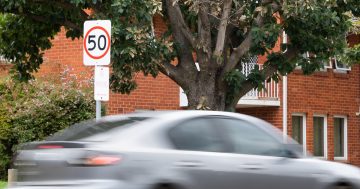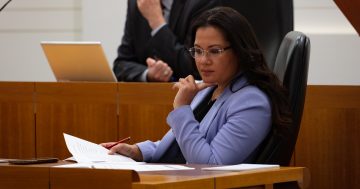
Tara Craemer-Banks (aged 16), ACT Greens MLA Johnathan Davis and Dr Justin Barker of the Youth Coalition want to see the voting age lowered to 16. Photo: Lottie Twyford.
An ACT Government inquiry into a Greens’ proposal to lower the voting age to 16 has recommended that the Assembly not pass the bill.
The bill – introduced by Greens’ backbenchers Johnathan Davis and Andrew Braddock – would have allowed 16 and 17-year-olds in the ACT to vote in local elections but not in Federal elections. It would have also lowered the fine for not voting from $20 to $10.
Mr Braddock, who sat on the Standing Committee on Justice and Community Safety, which inquired into the bill, provided a dissenting report.
“I’m disappointed that, given the level of evidence in support of the Bill, particularly from a coalition of over 30 academic experts from universities and the youth sector, the committee has still chosen to not support the Bill,” Mr Braddock said.
“Young people have shown they want a voice when it comes to the decisions that impact their lives and their futures, and we owe it to them to keep campaigning on this issue.”
However, Mr Braddock said it is not the end of the proposal and the Greens would bring an improved bill back to the Assembly for consideration.

ACT Greens MLA Andrew Braddock co-sponsored the bill and said it would be improved and brought back to the Assembly for consideration. Photo: Michelle Kroll.
In his dissenting report, Mr Braddock argued there wasn’t any substantive or empirical evidence to support the committee, concluding that there would be potential mental health and wellbeing impacts on young people.
He also said there is no reason that any positive benefits documented by overseas jurisdictions which have lowered the age to 16 would be negated in the ACT because voting is compulsory here.
Mr Braddock acknowledged that compulsory voting – which could expose young people to criminal penalties and the justice system – was a consistent concern expressed in submissions to the inquiry, but he argued these concerns are not unique to 16 and 17 year-olds.
“For the population as a whole, the benefits of compulsory voting are seen to outweigh the costs of the consequences. It is perhaps time to re-examine infringement policies more broadly and their inequitable impacts across the community,” his report read.
He said he and his co-sponsor, Mr Davis, would explore these issues further.
ACT Labor’s position is that lowering the voting age to 16 is worth consideration, but voting should be compulsory. The Canberra Liberals, however, want the voting age to remain at 18.
Opposition Leader Elizabeth Lee said lowering the voting age constitutes “substantial electoral reform proposed by two Greens backbenchers with significant legal and social implications that have not been completely considered”.
Her party’s submission previously rubbished the proposal, accusing the Greens of trying to increase their vote.
The majority of respondents who participated in an online survey conducted during the inquiry supported lowering the voting age to 16.
Of the 438 responses received, 58 per cent agreed to lowering the voting age, 40 per cent disagreed and 2 per cent said they were unsure.
But the report said the committee was “cautious on drawing conclusions from the results” as participants were not randomly selected and would have been more likely to participate in the survey if they held strong views on the topic.
Instead, the committee recommended the ACT Government explore “alternative ways to further engage young people in the democratic process.”
The ACT Greens have long been pushing for the voting age to be lowered to 16 – first introducing legislation that would have done so in 1996. Their position used to be that voting for 16 to 17-year-olds should be compulsory, although this was changed in the latest bill, creating a point of difference from ACT Labor.
The ACT Electoral Commission is strongly opposed to lowering the voting age.
Earlier this year, Electoral Commissioner Damian Cantwell told the inquiry that there would be a significant administrative burden if the ACT became non-aligned with other jurisdictions, including the Commonwealth.
He was also concerned about children being forced to engage with the criminal justice system and potentially front court for failing to vote, as well as the possibility of a 16-year-old standing for election.





















